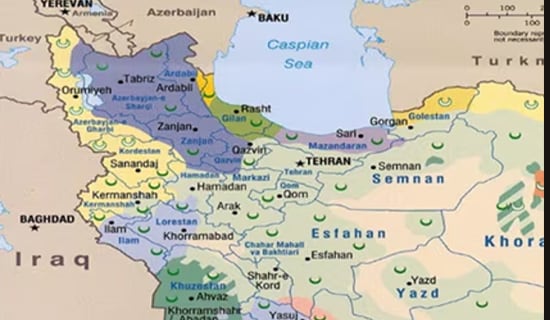On June 12, 2023, Chinese pundit and social media influencer Sima Pingbang posted to his Haokan account a video about recent reports in U.S. media suggesting that China is building a surveillance base in Cuba in order to monitor American military and commercial activity. Sima said that the U.S. learned important lessons from the Cuban Missile Crisis and therefore would be concerned about Chinese activity in Cuba. He argued that it is unlikely that China would construct new bases in Cuba because it would be much easier for it to repurpose existing Cuban equipment and to use the Belt and Road Initiative to share intelligence with Cuba and other countries. Sima also suggested that the American media reports on the subject indicate that there is a force within the United States that wants to interfere with relations between China and the United States. In addition, he said that American airspace is extremely vulnerable to Chinese and Russian technology, and that China can exploit this fact to drag the U.S. into an expensive arms race in order to destabilize it or to "contain and compel the United States to significantly reduce its strategic threat against China."
To view the clip of Chinese pundit Sima Pingbang, click here or below:
"If China Wants To Establish A Surveillance Base Against The U.S. In Cuba, It Would Actually Be Quite Easy"
Sima Pingbang: "Let's discuss a mind-boggling matter. America's Wall Street Journal and the New York Times reported, one after the other, that according to three informed U.S. officials, China is planning to establish a surveillance post somewhere in Cuba, about 160 kilometers from the Florida coastline. U.S. officials are concerned that this facility could execute espionage activities against the United States by intercepting electronic signals from nearby U.S. military and commercial facilities.




"If you look at the map, you'll understand that Cuba is located across from the southeastern tip of the United States. The straight-line distance between the U.S. and Cuba is very close. If a so-called listening base is really established here, then theoretically it would, as these two U.S. media outlets have stated, enhance China's technical capabilities to monitor sensitive activities in the southeastern states of the U.S., including several military bases.
"Furthermore, in my view, an even more significant point is, if China wants to establish such a surveillance base against the United States in Cuba, it would actually be quite easy.


"Now we need to ask, first, even without China's involvement, has Cuba already established such a surveillance base? Secondly, even if it is as the U.S. media says, why is China only establishing a surveillance base now? What has it been doing before? In 1959, the U.S. deployed medium-range ballistic missiles in Italy and Turkey. In order to turn the tables, the Soviet Union decided in June 1962 to deploy medium-range missiles in Cuba and provide II-28 bombers. The Soviets disassembled dozens of missiles and planes, packed them into containers and shipped them to Cuba. At the same time, 3,500 military technicians were also sent to Cuba. Moreover, each missile carried a nuclear warhead with a yield twenty to thirty times greater than the atomic bomb dropped on Hiroshima. Subsequently, these Soviet weapons were secretly installed in Cuba.
"It wasn't until August 1962 that the Americans discovered them, leading to the outbreak of the Cuban Missile Crisis. The crisis went through a very tortuous process, with both Khrushchev and Kennedy eventually choosing to compromise. The Soviets finally withdrew the weapons deployed against the United States in Cuba, against the objections of Cuba. The U.S. also withdrew the weapons it had previously deployed against the Soviet Union. One point to emphasize is that the Castro regime in Cuba at the time was firmly opposed to Khrushchev's withdrawal of weapons, so Cuba felt it had been deceived by the Soviets.
"Americans are particularly sensitive to the news that the Chinese want to establish a base in Cuba, due to the lessons learned from the Cuban Missile Crisis. However, the rumored base today is said to be a surveillance base, not a missile base. Given the long-standing animosity between the U.S. and Cuba and their unique geographical positions, I believe that the two countries must be spying on each other. However, compared to Cuba, the United States' surveillance capability is certainly much stronger.




"In fact, if China wants to monitor the U.S. through Cuban territory, it does not need to establish a completely new surveillance base. All it needs to do is to repurpose more powerful surveillance equipment and aid Cuba with it, which would be much simpler than transporting nuclear weapon components as in the past. Then, all China needs to do is to share intelligence on the U.S. with Cuba. Much like what the U.S. does with the 'Five Eyes Alliance,' theoretically speaking, it would be a simple task for China to achieve this.




"Therefore, if it were really like what The Wall Street Journal and the New York Times were saying, that China wants to openly establish a surveillance base in Cuba to monitor the U.S., it would actually be a foolish idea. Of course, it's also impossible to see any signs that China and Cuba are currently forming an alliance similar to the 'Five Eyes Alliance.'
"From November 24 to 26 last year, the First Secretary of the Central Committee of the Communist Party of Cuba and the President of Cuba, Miguel Diaz-Canel, was invited to visit China. A joint declaration titled 'On Deepening Sino-Cuban Relations in the New Ear' was issued by China and Cuba. The joint declaration contained a total of 18 items. Only in the 11th and 15th items, which discussed cooperation in jointly building the 'belt and Road Initiative' and Cuba's support for China's proposed 'Global Data Security Initiative,' was there a potential implication of some specific technological cooperation.
"However, there was absolutely no hint of the two countries establishing close intelligence cooperation akin to the 'Five Eyes Alliance.' The more interesting follow-up to this 'spy base in Cuba' incident is that the Chinese authorities have not made a statement from beginning to end, neither acknowledging nor denying it, as if this never happened. The first to come out and debunk the rumors was the United States. On the same day that the Wall Street Journal broke the news, the spokesperson for the White House National Security Council, John Kirby, explicitly stated that the report was inaccurate. The Pentagon also stated that the report was not accurate. Subsequently, the Cuban Ministry of Foreign Affairs also declared that the U.S. media was spreading rumors.


"There Seems To Be A Very Powerful Force Within The United States Trying To Stop The Establishment Of A Diplomatic Policy To Ease Relations With China And To Stop Blinken's Visit To China"
"In February of this year, the U.S. Secretary of State, Anthony Blinken, originally planned to visit China. However, the 'Wandering Balloon' incident occurred, and Blinken announced the postponement of his visit to China. The United States originally intended to use the postponement as a bargaining chip with China, but China simply took advantage of the situation and has since been giving a cold reception to all requests for visits by senior U.S. officials.
"In early June, Blinken again planned to visit China, but the U.S. media once again exposed this fabricated incident of a Cuban listening base, suggesting that there seems to be a very powerful force within the United States trying to prevent the U.S. government from adopting a diplomatic policy to ease relations with China and to stop Blinken's visit to China.
"However, the U.S. now desperately needs to improve relations with China, so the White House and the Pentagon were the first to come out to slap the Wall Street Journal and the New York Times. It was as if Blinken was saying: 'All of you shut up, I am going to visit China. I am definitely going to visit China.'



"Not long after the 'Wandering Balloon' incident, I did a program where I mentioned that experts who have long been focusing on the U.S. strategic capabilities believe that the 'Wandering Balloon' incident has exposed the various gaps, weaknesses, and deficiencies in the United States' domestic air defense, especially its high-altitude defense. In the extremely limited regional defense of the U.S. homeland, 'everything that can be organized' includes only the deployment at a few dozen sites, including fighter jets that can intercept conventional cruise missiles and Patriot missile systems.



"In 2021, then Deputy Chief of Operations of the North American Air Defense Command, Colonel Chris Struve, publicly admitted that the U.S. has only deployed air defense missiles in the most important areas such as the capital Washington DC, and has not deployed nationwide, and the U.S. homeland is 'no longer a sanctuary.'
"Within 3-5, Or Even Ten Years, The Airspace Over The U.S. Mainland Is Practically Wide Open To Countries Like China And Russia, Which Have Powerful Long-Range Strategic Delivery Capabilities"
"Meanwhile, what the Wall Street Journal and the New York Times are worried about is just China establishing listening bases in Cuba to carry out 'close-range reconnaissance.' In fact, there is no need for China to do this. According to the 'Belt and Road initiative,' as long as we implement the global security initiative in countries along the 'Belt and Road,' including Cuba, I don't think it's a big problem to share the so-called secrets about the southeastern part of the U.S. homeland from Cuba – it's up to us whether we want to or not.



"This includes intelligence on some military bases, which would be very simple. If China really wants to do this, its purpose will definitely not be so simple. Just now, we took the opportunity to revisit the events of the 1962 U.S.-Soviet missile crisis. In reality, the missile defense system in the U.S. today is far inferior to that of 1962. On the other hand, it is China that can impose a 'close-in deterrence' on the United States, rather than 'close-in reconnaissance.' The United States now wants to establish a nationwide air defense missile network, which will be a costly and time-consuming project.



"Within three to five, or even ten years, the airspace over the U.S. mainland is practically wide open to countries like China and Russia, which have powerful long-range strategic delivery capabilities, especially as China's strategic offensive capabilities are rapidly developing.




"I think we can view this as a good opportunity to further drag the United States, which is already in debt by 32 trillion U.S. dollars, into the next arms race that could be enough to bring it down, or at least an excellent time to contain and compel the United States to significantly reduce its strategic threat against China.










